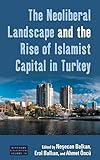The Neoliberal Landscape and the Rise of Islamist Capital in Turkey / ed. by Neşecan Balkan, Erol Balkan, Ahmet Öncü.
Material type: TextSeries: Dislocations ; 14Publisher: New York ; Oxford : Berghahn Books, [2015]Copyright date: ©2015Description: 1 online resource (314 p.)Content type:
TextSeries: Dislocations ; 14Publisher: New York ; Oxford : Berghahn Books, [2015]Copyright date: ©2015Description: 1 online resource (314 p.)Content type: - 9781782386384
- 9781782386391
- HC492 .N4613 2015
- online - DeGruyter
| Item type | Current library | Call number | URL | Status | Notes | Barcode | |
|---|---|---|---|---|---|---|---|
 eBook
eBook
|
Biblioteca "Angelicum" Pont. Univ. S.Tommaso d'Aquino Nuvola online | online - DeGruyter (Browse shelf(Opens below)) | Online access | Not for loan (Accesso limitato) | Accesso per gli utenti autorizzati / Access for authorized users | (dgr)9781782386391 |
Frontmatter -- Contents -- Tables -- Abbreviations -- Preface -- Introduction -- Chapter 1 – Islamism: A Comparative-Historical Overview -- Chapter 2 – Class, State, and Religion in Turkey -- Chapter 3 – The Deep Fracture in the Big Bourgeoisie of Turkey -- Chapter 4 – The Islamist Big Bourgeoisie in Turkey -- Chapter 5 – Islamic Capital -- Chapter 6 – Reproduction of the Islamic Middle Class in Turkey -- Chapter 7 – The Question of AKP Hegemony: Consent without Consensus -- Chapter 8 – Globalization, Islamic Activism, and Passive Revolution in Turkey: The Case of Fethullah Gülen -- Chapter 9 – The Laic-Islamist Schism in the Turkish Dominant Class and the Media -- Notes on Contributors -- Index
restricted access online access with authorization star
http://purl.org/coar/access_right/c_16ec
Islamist capital accumulation has split the Turkish bourgeoisie and polarized Turkish society into secular and religious social groupings, giving rise to conflicts between the state and political Islam. By providing a long-term historical perspective on Turkey's economy and its relationship to Islamism, this volume explores how Islamism as a political ideology has been utilized by the conservative bourgeoisie in Turkey, and elsewhere, to establish hegemony over labor. The contributors analyze the relationship between neoliberalism and the political fortunes of the Islamist Justice and Development Party (AKP), and examine the similarities and differences amongst new factions in the secular and Islamic middle class that have benefited economically, socially, and culturally during the AKP's reign. The articles also investigate the impact of the Gülen Movement and the role of the media in shaping the contours of intra-class struggle within contemporary Turkish political and social life.
Mode of access: Internet via World Wide Web.
In English.
Description based on online resource; title from PDF title page (publisher's Web site, viewed 25. Jun 2024)


